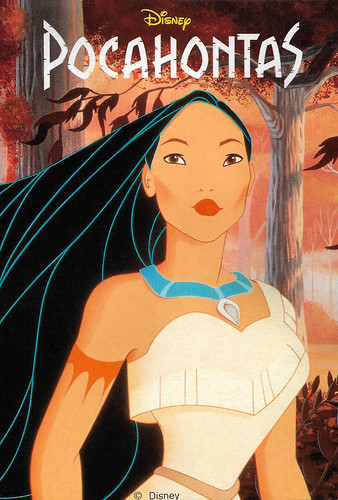
French postcard by Sonis, no. C. 582. Image: Disney. Pocahontas in Pocahontas (Mike Gabriel, Eric Goldberg, 1995).

Italian postcard by Nuova Arti Grafiche Ricordi, Milano, no. 1722. Image: Disney. John Smith and Pocahontas in Pocahontas (Mike Gabriel, Eric Goldberg, 1995).

Spanish postcard by Ediciones Beascoa SA, Barcelona, no. 69. Image: Disney. John Smith and Pocahontas in Pocahontas (Mike Gabriel, Eric Goldberg, 1995).

Spanish postcard by Ediciones Beascoa SA, Barcelona, no. 74. Image: Disney. Flit, John Smith, Pocahontas and Meeko in Pocahontas (Mike Gabriel, Eric Goldberg, 1995).

Spanish postcard by Ediciones Beascoa SA, Barcelona, no. 75. Image: Disney. John Smith, Pocahontas, Flit and Meeko in Pocahontas (Mike Gabriel, Eric Goldberg, 1995).
The two immediately click and fall in love
In the year 1607, an English ship prepares to set sail for North America to found a colony and search for gold. One of the ship's crew is the adventurer John Smith. During the voyage, he saves the life of young sailor Thomas when he falls overboard.
Meanwhile, in North America, Indian chief Powhatan and his warriors return from a war they won. Powhatan's daughter Pocahontas is told that the warrior Kocoum has asked for her hand. However, she herself does not see him. She asks Grandmother Willow, a talking tree, for advice. The latter tells Pocahontas to listen to her heart.
Shortly afterwards, the British colonists arrived. Pocahontas becomes curious and she decides to take a look with her raccoon Meeko and the hummingbird Flit. John Smith explores the area and Pocahontas follows him. When she is discovered by Smith, the two immediately click and fall in love. Pocahontas makes John realise that Indians are not at all such savages as people in John's country think. She also tells him to see the earth as more than just something he can own.
Between the other Indians and the settlers, however, clashes soon arise. In the first encounter, a warrior from Pocahontas' tribe is shot. Powhatan decides to declare war on the British and enlists the help of other Indian tribes. The situation does not improve when the leader of the settlers, Governor John Ratcliffe, discovers that there may be no gold in the area. Indeed, he had wanted to use this expedition to finally make his name at the British court. In his obsession, he concludes that the Indians naturally have the gold and he must take it from them by force.
One evening, Pocahontas and John meet again. However, they are followed by Kocoum and Thomas. Kocoum attacks John, after which Thomas intervenes and shoots Kocoum dead. John takes the blame for killing Kocuom and he is captured. He will be executed the next day before the battle between the Indians and settlers breaks loose...
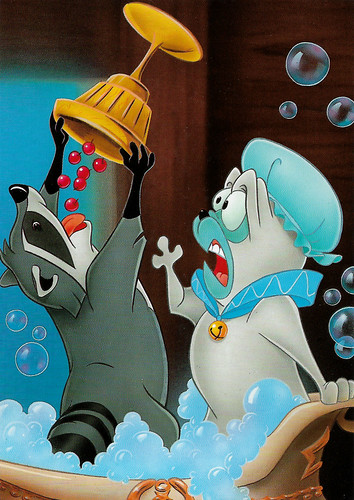
Vintage postcard by European Greetings, no. 535615. Image: Disney. Meeko and Percy in Pocahontas (Mike Gabriel, Eric Goldberg, 1995).

British postcard by The Art Group Ltd, no. 9368. Image: Disney. Meeko and John Smith in Pocahontas (Mike Gabriel, Eric Goldberg, 1995).
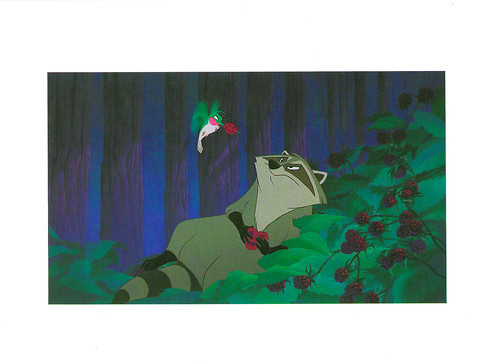
British postcard by The Art Group Ltd, no. 9372. Image: Disney. Meeko and Flit in Pocahontas (Mike Gabriel, Eric Goldberg, 1995).
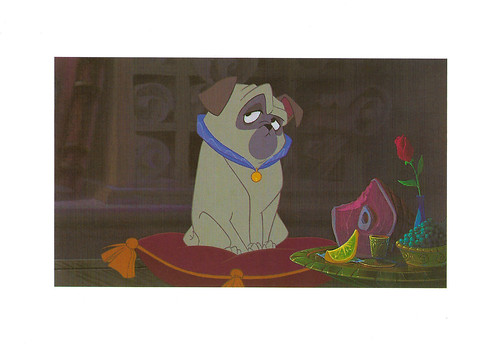
British postcard by The Art Group Ltd, no. 9375. Image: Disney. Percy in Pocahontas (Mike Gabriel, Eric Goldberg, 1995).
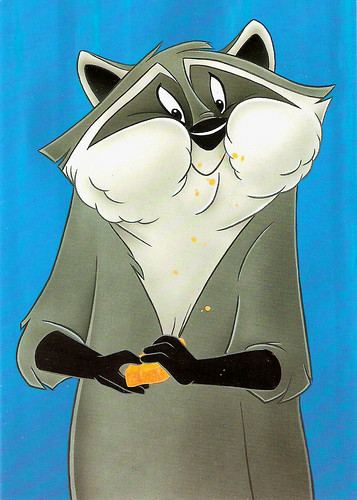
Dutch postcard by Interstat, Amsterdam. Image: Disney. Meeko in Pocahontas (Mike Gabriel, Eric Goldberg, 1995).
A historical Indian princess who warmly welcomed the European settlers
During the famed "Disney Renaissance", a period that started with the release of The Little Mermaid (1989), the studio was creating modern classics with every film they released. Many at Disney had high hopes for Pocahontas (1995) upon its initial release. Then-studio head Jeffrey Katzenberg regarded it even as a more prestigious project than The Lion King (1994), and believed that it had a chance of earning an Academy Award nomination for Best Picture, following in the steps of Beauty and the Beast (1991).
Despite the obvious presence of fantasy elements, Pocahontas was the first full-length Disney animated film based at its core on a true story. In Peter Pan (1953), Disney's 14th animated film, the Indians were elaborated according to the stereotypical Western image, with elements such as the peace pipe and the standard cry "ugh". In Pocahontas, the Indians were depicted more realistically. As such, most of the film's main characters are based on actual historical figures.
Pocahontas is based on the historical princess of that name, who was indeed one of the few Indians who warmly welcomed the European settlers. In reality, however, in 1607, the year in which the film is set, she was only 13 years old. She also never had a romantic relationship with John Smith. She did eventually marry another Briton, John Rolfe. The figure of John Smith is based on the historical person of the same name. However, this John Smith was still in England in 1607. Governor Ratcliffe is a combination of several historical characters. His name comes from John Ratcliffe, who was once governor of the colony of Jamestown. However, he was not, as the film suggests, the first governor, nor was he present on the ship on which John Smith travelled to the colony.
Pocahontas was released to mixed reactions from reviewers, who praised its animation and music but criticised its story; the film's racial overtones and historical inaccuracy also garnered a mix of condemnation and praise. However, everybody liked Meeko, Pocahontas's pet raccoon with a love of food, especially John Smith's biscuits. The design for the film is sumptuous, with mostly blues and a seamless style that never gets in the way and illustrates the action and the feminine nature of the film beautifully.
Pocahontas was the first Disney film without a happy ending. It dealt with more adult themes and tones and did not appeal to younger children, as much as the earlier Disney hits had. The film was less successful commercially than was hoped. However, Pocahontas did succeed at the box office, earning $346 million, and it received two Academy Awards for Best Musical or Comedy Score for Alan Menken and Best Original Song for 'Colors of the Wind'.
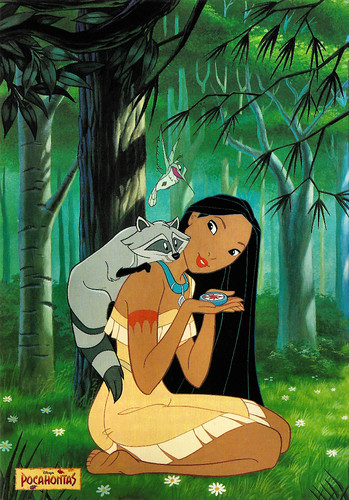
Italian postcard by Nuovi Arti Grafiche Ricordi S.r.L, Milano, no. 1717. Meeko and Pocahontas in Pocahontas (Mike Gabriel, Eric Goldberg, 1995).

French postcard by MD Chromovogue, no. D 920-3. Pocahontas, Meeko, John Smith and Governor Ratcliffe in Pocahontas (Mike Gabriel, Eric Goldberg, 1995).

Vintage postcard by European Greetings, no 535615. Image: Disney. Meeko, Pocahontas and Flit in Pocahontas (Mike Gabriel, Eric Goldberg, 1995).

Vintage postcard by European Greetings, no. 535615. Image: Disney. Pocahontas and John Smith in Pocahontas (Mike Gabriel, Eric Goldberg, 1995).
Sources: Wikipedia (Dutch and English), and IMDb.
No comments:
Post a Comment